|
|
Published March 4th, 2020
|
Digging Deep with Goddess Gardener, Cynthia Brian
|
| Let the sunshine in |
| By Cynthia Brian |
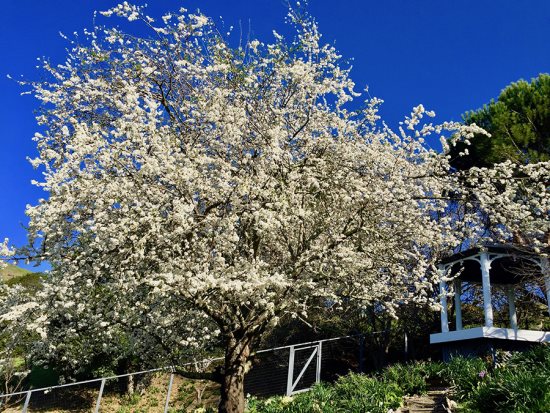 |
| Wild cherry plums trees are magnificent in bloom. Photo Cynthia Brian |
"The sun does not shine for a few trees and flowers, but for the wide world's joy" - Henry Ward Beecher
 It's been at least seven years since we've enjoyed a warm, sun-filled February. Being accustomed to cold, dreary, gray days in the months of Aquarius and Pisces, this year buoyed my spirits immensely even though I know that we need rain. I admit I thoroughly lapped up those 70-plus degree days spending hours in the garden weeding, pruning and planting with a break to Bodega Bay to ride a bike on the beach, inhale the salt air, and watch the glorious sunset. If winter is going to be mild and bright, why not enjoy it?
It's been at least seven years since we've enjoyed a warm, sun-filled February. Being accustomed to cold, dreary, gray days in the months of Aquarius and Pisces, this year buoyed my spirits immensely even though I know that we need rain. I admit I thoroughly lapped up those 70-plus degree days spending hours in the garden weeding, pruning and planting with a break to Bodega Bay to ride a bike on the beach, inhale the salt air, and watch the glorious sunset. If winter is going to be mild and bright, why not enjoy it?
 The tulip magnolias, peach, plum and pear trees are in full bloom. The bees are busy buzzing their business in the blossoms. Sweet scents of narcissi, stock, and freesia fill the air. Oxalis, also known as shamrock, carpets vineyards, trails and roadsides. Wisteria and lilac are budded, ready to burst any day. Early spring erupted in mid-February, a full month ahead of schedule. In many Northern California areas, temperatures have been in the mid-80s. If it wasn't for water shortages and the rising trajectory of global warming, we could all be rejoicing. Instead, we may need to chant and dance for rainfall to ward off another summer drought.
The tulip magnolias, peach, plum and pear trees are in full bloom. The bees are busy buzzing their business in the blossoms. Sweet scents of narcissi, stock, and freesia fill the air. Oxalis, also known as shamrock, carpets vineyards, trails and roadsides. Wisteria and lilac are budded, ready to burst any day. Early spring erupted in mid-February, a full month ahead of schedule. In many Northern California areas, temperatures have been in the mid-80s. If it wasn't for water shortages and the rising trajectory of global warming, we could all be rejoicing. Instead, we may need to chant and dance for rainfall to ward off another summer drought.
 Compost will be your most important gardening ingredient this season. By turning organic waste into humus, you will be feeding your plants in the same manner that Mother Nature has been nurturing the planet since the beginning of time. Compost will help your plants retain moisture, curtail erosion, maintain a constant temperature, and it will enrich your soil. It's so simple to make that everyone can easily do it.
Compost will be your most important gardening ingredient this season. By turning organic waste into humus, you will be feeding your plants in the same manner that Mother Nature has been nurturing the planet since the beginning of time. Compost will help your plants retain moisture, curtail erosion, maintain a constant temperature, and it will enrich your soil. It's so simple to make that everyone can easily do it.
 Recipe for Compost
Recipe for Compost
 In an open pile or composting bin, add both green and dry plant matter plus eggshells, coffee grinds, tea leaves, and fish bones. Green matter includes grass clippings, vegetables, weeds without seeds, peelings, and green leaves. Dry matter includes paper, straw, twigs, fall leaves, and dried stalks. Don't add any animal feces, diseased plants, or meat products. Moisten everything without soaking it and turn with a pitchfork at least weekly.
In an open pile or composting bin, add both green and dry plant matter plus eggshells, coffee grinds, tea leaves, and fish bones. Green matter includes grass clippings, vegetables, weeds without seeds, peelings, and green leaves. Dry matter includes paper, straw, twigs, fall leaves, and dried stalks. Don't add any animal feces, diseased plants, or meat products. Moisten everything without soaking it and turn with a pitchfork at least weekly.
 Worms may be added for speedier results. The compost will cook and steam. Add water as necessary if the pile is too dry. Your compost is ready to return to your garden when it smells earthy, sweet, and looks like a crumbly chocolate cake. I recommend creating two or three different piles as they will finish at different times and you can always have a batch cooking. Making your own compost is an excellent way to recycle with almost zero waste. As an added bonus it is free plant food!
Worms may be added for speedier results. The compost will cook and steam. Add water as necessary if the pile is too dry. Your compost is ready to return to your garden when it smells earthy, sweet, and looks like a crumbly chocolate cake. I recommend creating two or three different piles as they will finish at different times and you can always have a batch cooking. Making your own compost is an excellent way to recycle with almost zero waste. As an added bonus it is free plant food!

 Cynthia Brian's Gardening Guide for March
Cynthia Brian's Gardening Guide for March
 CREATE simple arrangements with branches cut from blooming peach, pear or plums. Add a few daffodils or freesias.
CREATE simple arrangements with branches cut from blooming peach, pear or plums. Add a few daffodils or freesias.
 BLOW the "angel" seeds of dandelions if you want dandelions growing in your garden. (This was a favorite past time as a child, although we weren't allowed to blow "angels" into the lawn.) Dandelions are nutritious and delicious in salads and sautés and they attract quail.
BLOW the "angel" seeds of dandelions if you want dandelions growing in your garden. (This was a favorite past time as a child, although we weren't allowed to blow "angels" into the lawn.) Dandelions are nutritious and delicious in salads and sautés and they attract quail.
 PICK lettuce, parsley, arugula, Swiss chard and baby mustard to add to meals.
PICK lettuce, parsley, arugula, Swiss chard and baby mustard to add to meals.
 MAKE an artful wall hanging using a variety of succulents.
MAKE an artful wall hanging using a variety of succulents.
 ADMIRE the tulip magnolias as they emerge or cut a stem to enjoy indoors.
ADMIRE the tulip magnolias as they emerge or cut a stem to enjoy indoors.
 WATCH for aphids, moths, slugs, and snails on artichoke plants as they mature. Blast the leaves with water if you see any infestation.
WATCH for aphids, moths, slugs, and snails on artichoke plants as they mature. Blast the leaves with water if you see any infestation.
 TALK to your doctor if you are experiencing pollen-related allergies. Pollen fertilizes plants but causes misery for sufferers. Acacia trees are beautiful in bloom but may trigger hay fever or asthma.
TALK to your doctor if you are experiencing pollen-related allergies. Pollen fertilizes plants but causes misery for sufferers. Acacia trees are beautiful in bloom but may trigger hay fever or asthma.
 AERATE and de-thatch lawns if necessary. Be prepared to scatter seeds and fertilizer before a rain.
AERATE and de-thatch lawns if necessary. Be prepared to scatter seeds and fertilizer before a rain.
 SHOOT lots of photos of spring unfolding.
SHOOT lots of photos of spring unfolding.
 BEFORE recycling empty milk cartons, fill with water to use on houseplants. The residual calcium is good for the plants and it also rinses clean the cartons for the bins.
BEFORE recycling empty milk cartons, fill with water to use on houseplants. The residual calcium is good for the plants and it also rinses clean the cartons for the bins.
 BUY your favorite seed packets in anticipation of sowing.
BUY your favorite seed packets in anticipation of sowing.
 SPREAD alfalfa pellets mixed with diatomaceous earth around your rose bushes to promote large blooms and healthy plants.
SPREAD alfalfa pellets mixed with diatomaceous earth around your rose bushes to promote large blooms and healthy plants.
 The vernal equinox is still three weeks away. The sun is shining on our gardens and for all of us. It's playtime.
The vernal equinox is still three weeks away. The sun is shining on our gardens and for all of us. It's playtime.
 Happy Gardening. Happy Growing!
Happy Gardening. Happy Growing! |
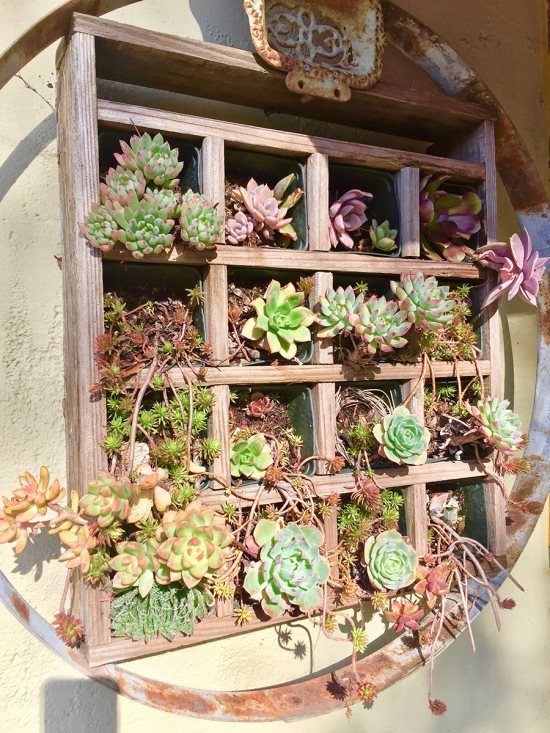 |
| Create an art piece with easy-to-grow succulents. Photo Cynthia Brian |
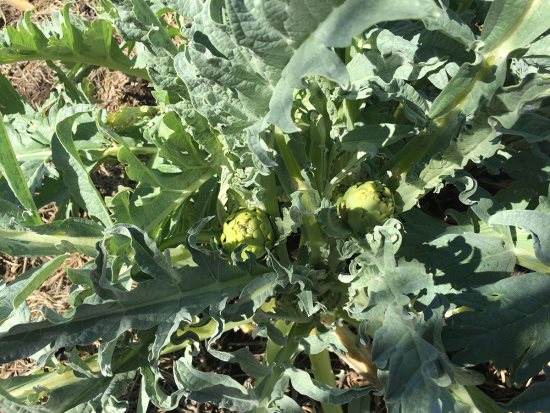 |
| Baby Artichokes need protection for insects. Photo Cynthia Brian |
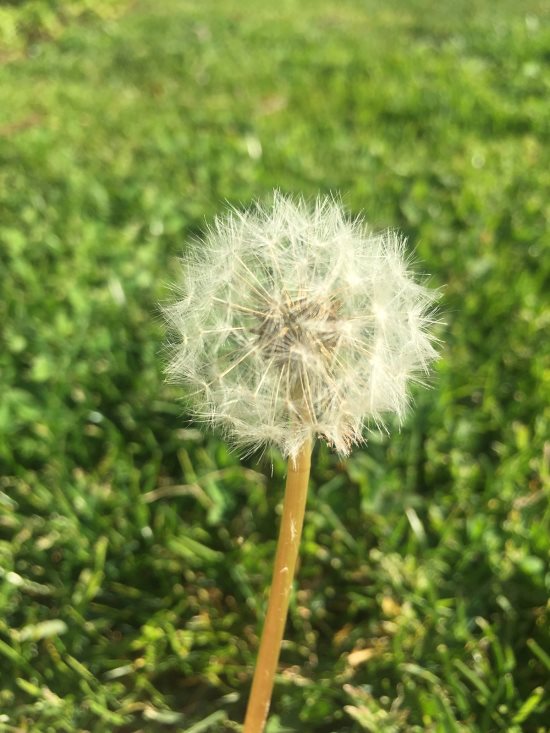 |
| What child can resist blowing a dandelion "angel" puff? Photo Cynthia Brian |
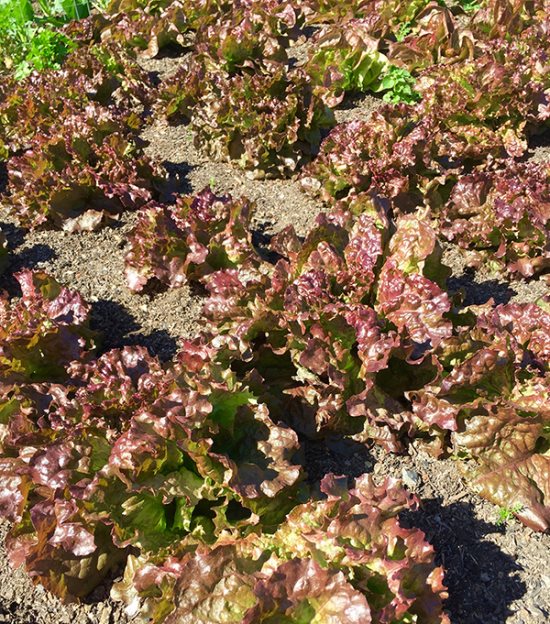 |
| Photo Cynthia Brian |
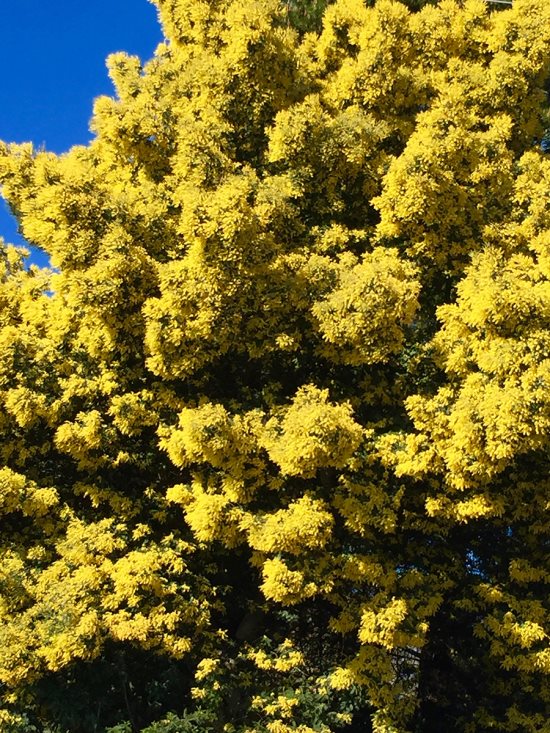 |
| Acacia trees are beautiful in bloom but may trigger hay fever or
asthma. |
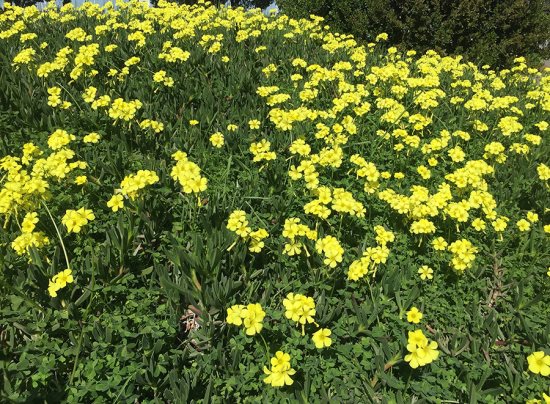 |
| Field of oxalis blooming amongst the ice plant. |
 |
| Cynthia Brian outdoors on a cooler February day. Cynthia Brian, The Goddess Gardener, is available for hire to help you prepare for your spring garden. Raised in the vineyards of Napa County, Cynthia is a New York Times best-selling author, actor, radio personality, speaker, media and writing coach as well as the Founder and Executive Director of Be the Star You Are!r 501 c3. Tune into Cynthia's StarStyler Radio Broadcast at
www.StarStyleRadio.com. Buy copies of her best-selling books, including, Chicken Soup for the Gardener's Soul, Growing with the Goddess Gardener, and Be the Star You Are! Millennials to Boomers at
www.cynthiabrian.com/online-store. Hire Cynthia for writing projects, garden consults, and inspirational lectures.
Cynthia@GoddessGardener.com
www.GoddessGardener.com |
|
|
|











